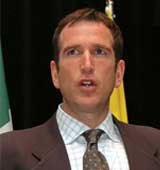|
Executive Interviews: Interview with Jeffrey M Cohn on Talent Management
February 2007
-
By Dr. Nagendra V Chowdary
 Jeffrey M Cohn
Jeffrey M Cohn Director of Research at Chief Executive Leadership Institute (now at Yale); Director at the Law & Economics Consulting Group. 
-
Are there any precautions that
need to be taken at the recruitment
stage itself in identifying the
potential talent? Are there any
acclaimed corporate practices?
Recruiting talent is where it all
begins. Yet most companies have
poor recruiting functions, buried
deep in bureaucratic human resource
departments, and rely on overworked
and sometimes under trained HR
employees to help them identify,
recruit and assimilate key external
talent. Companies should make a
conscious effort to upgrade their
recruiting department.They should
selectively partner with best in class
external partners to help them
proactively zero in on the best
candidates.
|
|
Right now its a very
reactive process. Companies wait
until a position becomes vacant, then
word of that vacancy slowly trickles
down to the HR department, then the
HR department creates a position
description for the job that needs to
be filled, then finally, the company
begins an external search. Executive recruiters may be brought into the
process. But frankly, by this time, the
company is already behind the 8
Ball. Had they been more proactive,
the company would have had several
external (and internal) candidates
lined up well before the position became vacant. And again, external
partners can help companies become
more proactive. A firm called Talent
Intelligence, for example, helps
clients proactively identify key talent
in other firms that could immediately
add value if successfully recruited.
Thats obviously an invaluable
service in todays talent driven
economy. -
We always hear of succession
planning only at the top. Why not at
the middle and first level
management? Why do you think the
boards, the business press,
academic research and consultants too concentrate (seemingly at least)
only on that one chair? After all you
find the need for talent at all the
levels. Do you think, therefore, its
more of an orchestrated celebration
rather than a shared celebration?
This is a good question to end on,
because the news is encouraging.
Boards are slowly but surely starting
to better embrace their rising stars.
They are making more of a
conscientious effort to meet high
performing managers and rising stars
earlier in their careers. Martin
McGuinn, the former CEO of Mellon
Financial, used to regularly invite
rising stars to Board meetings to give
presentations. And CEOs should
ensure that succession planning and
leadership development is embedded
into the very fabric of the
organizations culture. Every manager, at all levels, needs to think about how
he or she can improve the skills of his
or her direct reports and ultimately
promote them into new, more
demanding positions. This is true in
organizations of all shapes and sizes.
It was true at Tyson Foods and at
Mellon, both Fortune 500 companies,
and its equally true in smaller to
mid-size firms. More and more I am
even seeing prescient start up
companies spend time thinking about
succession planning, before the
company scales in size and
complexity. Taking a company from
$0 to $50 mn in revenues, after all, is
a far different challenge and requires
far different leadership skills than
scaling from $50 to $250 mn. Savvy
venture capitalists like Kleiner
Perkins help their portfolio
companies think about these kinds of
issues far in advance. Thats clearly a
big reason for the success of their
portfolio companies.
1.
Diversity and Talent Management Case Study
2. ICMR
Case Collection
3.
Case Study Volumes
|
The Interview was conducted by Dr. Nagendra V Chowdary, Consulting Editor, Effective
Executive and Dean, IBSCDC, Hyderabad. This Interview was originally published in Effective Executive, IUP, February 2007. Copyright © February 2007, IBSCDC
No part of this publication may be copied, reproduced or distributed, stored in a retrieval
system, used in a spreadsheet, or transmitted in any form or medium electronic,
mechanical, photocopying, recording, or otherwise without the permission of IBSCDC. |
